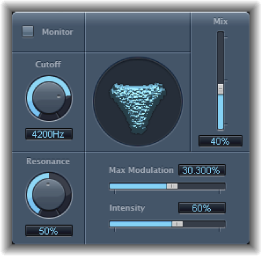Phase Distortion
The Phase Distortion effect is based on a modulated delay line, similar to a chorus or flanger effect (see Modulation Effects). Unlike these effects, however, the delay time is not modulated by a low frequency oscillator (LFO), but rather by a lowpass-filtered version of the input signal itself, using an internal sidechain. This means that the incoming signal modulates its own phase position.
The input signal only passes the delay line and is not affected by any other process. The Mix parameter blends the effect signal with the original signal.
Cutoff knob and field: Sets the (center) cutoff frequency of the lowpass filter.
Resonance knob and field: Emphasizes frequencies surrounding the cutoff frequency.
Display: Shows the impact of parameters on the signal.
Mix slider and field: Adjusts the percentage of the effect signal mixed with the original signal.
Max Modulation slider and field: Sets the maximum delay time.
Intensity slider and field: Sets the amount of modulation applied to the signal.
Phase Reverse checkbox (Extended Parameters area): Enable to reduce the delay time on the right channel when input signals that exceed the cutoff frequency are received. Available only for stereo instances of the Phase Distortion effect.
